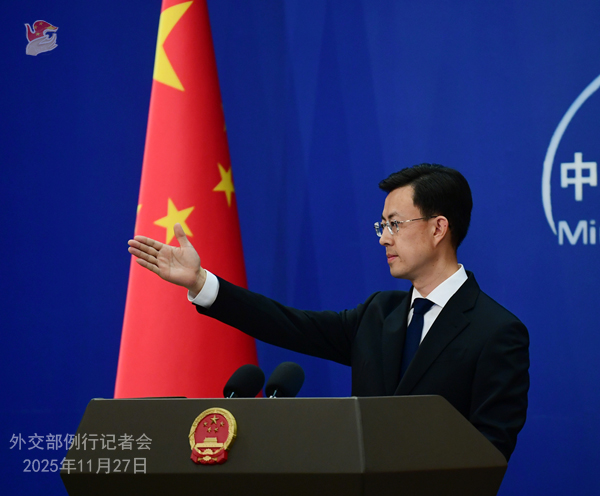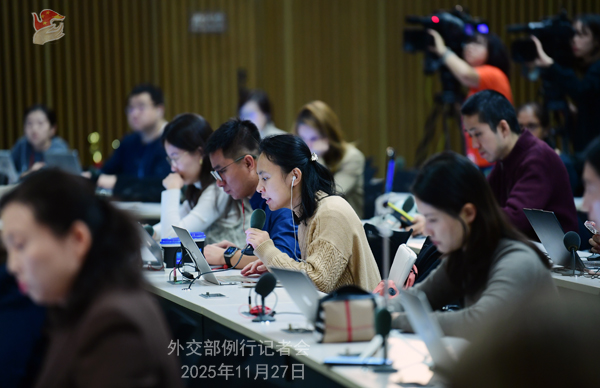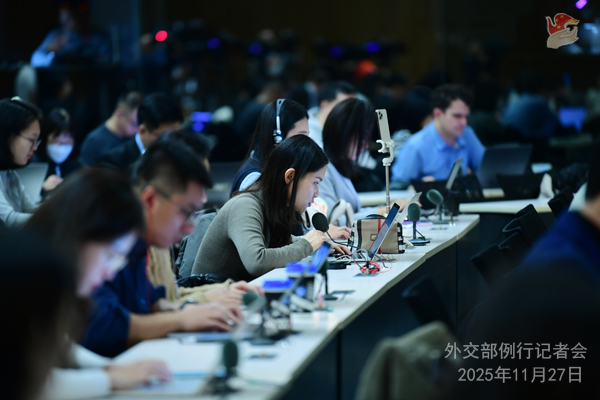
People’s Republic of China


China Daily: On November 27, the Chinese government released a white paper titled China’s Arms Control, Disarmament and Non-Proliferation in the New Era. This is the first time in 20 years that the Chinese government has comprehensively stated China’s policy on arms control, disarmament and non-proliferation by releasing a white paper. What is the background and significance for China to release this new white paper?
Guo Jiakun: China released white papers on arms control twice, in 1995 and 2005. This year marks the 80th anniversary of the victory of the Chinese People’s War of Resistance Against Japanese Aggression and the World Anti-Fascist War, and the founding of the United Nations. At this crucial historical juncture, the white paper, China’s Arms Control, Disarmament and Non-Proliferation in the New Era released by the Chinese government, is of great significance.
The current international security and arms control situation is complex and severe. Regional conflicts and turmoil are becoming more frequent, and the international arms race continues to escalate. Today, humanity again has to choose between peace and war, dialogue and confrontation, win-win cooperation and zero-sum game. It once again finds itself at a historic crossroads. The white paper systematically states China’s views and policies on the international security and arms control situation in the new era, and comprehensively elaborates on China’s positive endeavor, practical measures and remarkable achievements in constructively participating in the process of international arms control over the past 20 years, especially since the 18th National Congress of the CPC. It shows China’s sense of responsibility and commitment as a major country to actively take the lead in global security governance and safeguard international peace and security.
The white paper points out that China has always constructively participated in the process of international arms control, disarmament and non-proliferation, actively contributed China’s wisdom, initiatives and solutions, and is committed to improving the international security environment, enhancing international security cooperation, resolving international security dilemmas and improving global security governance. China is committed to be a builder of world peace, a contributor to global development and a defender of international order.
Releasing the new white paper on arms control is a concrete measure for China to actively practice the Global Security Initiative and the Global Governance Initiative. No matter how the international landscape evolves, China will always stand on the side of peace and justice and is a staunch force for safeguarding world peace and security. China is willing to work with all peace-loving countries to advocate an equal and orderly multipolar world and a universally beneficial and inclusive economic globalization, consolidate and develop the international arms control system with the United Nations at its core, and build a community with a shared future for humanity.
CCTV: Prime Minister Takaichi said yesterday at the debate with opposition party leaders that “having renounced all rights and claims under the Treaty of San Francisco, we are not in a position to recognize Taiwan’s legal status.” Does China accept that statement?
Guo Jiakun: China’s recovery of Taiwan is a victorious outcome of WWII and an integral part of the postwar international order. A series of instruments with legal effect under international law, including the Cairo Declaration, the Potsdam Proclamation, and the Japanese Instrument of Surrender, have all affirmed China’s sovereignty over Taiwan. The question regarding the status of Taiwan was already resolved once and for all when the Chinese people won the victory of the War of Resistance against Japanese Aggression in 1945. On October 1, 1949, the Central People’s Government of the People’s Republic of China (PRC) was established and has since been the sole legal government representing the whole of China. This is a change of government in which China, as a subject under international law, did not change and China’s sovereignty and inherent territorial boundaries stayed unchanged. Thus, the government of the PRC naturally and fully enjoys and exercises China’s sovereignty, including sovereignty over the Taiwan region. The 1972 Sino-Japanese Joint Statement states that “The Government of Japan recognizes the Government of the People’s Republic of China as the sole legal Government of China. The Government of the People’s Republic of China reiterates that Taiwan is an inalienable part of the territory of the People’s Republic of China. The Government of Japan fully understands and respects this stand of the Government of the People’s Republic of China, and it firmly maintains its stand under Article 8 of the Potsdam Proclamation.”
The so-called “Treaty of San Francisco” was issued with the exclusion of important parties to the WWII, such as the PRC and the Soviet Union, in order to seek a separate peace deal with Japan. The document goes against the provision that each government pledges not to make a separate armistice or peace with the enemies in the Declaration by United Nations signed by 26 countries in 1942, including China, the U.S., the UK and the Soviet Union and violates the UN Charter and the basic principles of international law. Anything set out in the treaty, including on the sovereignty over Taiwan or the handling of the territory and sovereign rights of China as a non-signatory, is thus entirely illegal and null and void.
Prime Minister Takaichi deliberately chose not to mention the Cairo Declaration and the Potsdam Proclamation—two international legal documents with full effect and underscored in the Sino-Japanese Joint Statement, the Treaty of Peace and Friendship Between China and Japan, and other bilateral treaties and she singularly brought up the illegal and invalid “Treaty of San Francisco.” That once again shows that the prime minister remains unwilling to own up to the wrongdoing and turn back from the erroneous course, and continues to damage the political foundation of China-Japan relations established under the spirit of the four political documents between the two countries, showing no regard for the authority of the UN and openly challenging the postwar international order and basic norms in international law, and even seeks to play up the so-called notion that Taiwan’s status is undetermined. That just compounds the wrongdoing. China firmly rejects that and calls for utmost vigilance from the international community. We once again urge the Japanese side to reflect on and correct its wrongdoing, retract the erroneous remarks, and take practical steps to honor its commitments to China and do what is least expected of Japan as a UN member state.
Beijing Youth Daily: Last week, when attending the 20th G20 Summit, Premier Li Qiang announced that China and South Africa jointly launched the Initiative on Cooperation Supporting Modernization in Africa which has drawn much attention. Can you brief us on the main contents of the Initiative and China’s considerations?
Guo Jiakun: Launching the Initiative on Cooperation Supporting Modernization in Africa was an important consensus reached between President Xi Jinping and South African President Cyril Ramaphosa during the Beijing Summit of the Forum on China-Africa Cooperation (FOCAC) in September, 2024. At the G20 Summit in Johannesburg, Premier Li Qiang announced that China and South Africa jointly launched the Initiative, which received widespread attention and recognition from various parties. The international community widely believes that the Initiative reflects China’s leading role in supporting Africa’s modernization and will further enhance Africa’s capacity for independent development, and inject strong impetus into the development and revitalization of the Global South.
The Initiative closely echoes the theme of the G20 Summit, focuses on the AU Agenda 2063, and responds to Africa’s needs and aspirations. It calls upon the international community to uphold six principles in the cooperation with Africa: justice and equitability, openness and win-win, putting the people first, diversity and inclusiveness, sustainable development, and peace and security. The Initiative also lists areas such as trade facilitation, green development, poverty reduction and people’s wellbeing, healthcare, climate change, localized development of enterprises, and value addition in the value chain as key areas of cooperation. The Initiative supports the African side in exploring modernization paths that suit their national conditions, and enhancing Africa’s voice and representation in international affairs. This reflects the common call of African countries at present, and sends out a strong voice of the times to promote multilateralism.
China is a strong supporter and sincere companion of Africa’s modernization. Supporting modernization in Africa is a common responsibility of the international community. China calls on all African countries and important development partners to actively support and participate in the Initiative, respect Africa’s right to choose its path to modernization independently, support Africa’s efforts to realize peace and development and make concrete contributions to Africa’s early realization of modernization.

Shenzhen TV: It’s reported that regarding Sanae Takaichi’s statement in the debate with opposition party leaders, the leader of the main opposition party in Japan said that considering that Takaichi has stopped referring to a specific contingency example, she has “effectively retracted” her remarks. Does China share that observation?
Guo Jiakun: Japanese Prime Minister Takaichi’s erroneous remarks seriously violated the spirit of the four political documents between China and Japan, eroded the political foundation of China-Japan relations, and triggered outrage among the Chinese people. “Stop referring to” is not the same as “retracting” the remarks. The two are completely different in nature. The Japanese side hopes to downplay Prime Minister Takaichi’s erroneous remarks and make it go away by “not referring to” them. That is just self-deceiving and wishful thinking, and China would absolutely not accept that.
NHK: Reports suggest that U.S. President Trump asked Japan’s Prime Minister Takaichi to lower the volume on Taiwan. Can you confirm if this was influenced by his earlier conversation with President Xi?
Guo Jiakun: The phone call between the leaders of the U.S. and Japan is a matter between the U.S. and Japan. I have no comment on that. The Taiwan question is China’s internal affair which brooks no interference by any external forces.
CRI: Recently, UN Human Rights Council’s Special Rapporteur on the negative impact of the unilateral coercive measures on the enjoyment of human rights Alena Douhan visited Cuba and pointed out in the preliminary findings that the U.S. sanctions have been substantially exacerbating the economic and humanitarian situation in Cuba and violated norms of international law. The Special Rapporteur called on the United States to lift all unilateral coercive measures applied to Cuba. What’s China’s comment?
Guo Jiakun: We noted relevant information. The Special Rapporteur’s report is fully consistent with the UN General Assembly resolution calling for an end to the embargo imposed by the United States against Cuba that was once again overwhelmingly adopted last month.
China opposes the U.S.’s blockade and sanctions against Cuba. China urges the U.S. to heed the call for justice from the international community, immediately lift the blockade and sanctions against Cuba and remove the country from the list of “state sponsors of terrorism.”
CCTV: It’s reported that the recent flooding in Thailand has killed at least 41 people. What’s China’s comment? Are there any Chinese people among the dead or injured?
Guo Jiakun: The severe flooding triggered by days of torrential rains in southern Thailand has caused serious deaths and injuries and economic loss. Our hearts go out to the Thai people who have been affected. We believe that under the strong leadership of the Thai government, people in the affected area will rebuild from the disaster soon.
Based on our knowledge, so far there have been no Chinese deaths or injuries.




